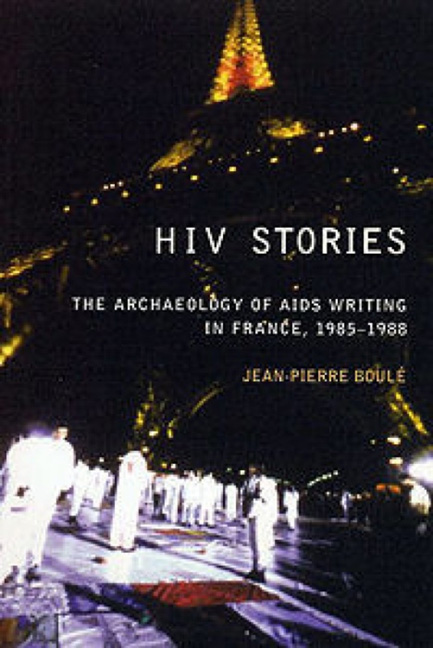Conclusion
Summary
Early AIDS writing went on in the margins of literature. Most of the books lack the usual literary qualities and yet found their way to being published and read. They have a fragmented, raw authenticity which makes them worth studying today. One can imagine the pressure of the subject-matter building up throughout the early 1980s and the bubble bursting when these texts were published, at times at the expense of literariness and often in the form of fragmented pieces rather than as fully fledged texts, reflecting the dwindling energy of their authors. They are not all built on the same model, and the subjective positioning of the presumed authors, both in terms of gender and sexual orientation, also varies widely. Dreuilhe and Aron aside, as far as we can tell, none of them had ever appeared in print before. Since these writings mostly come from the margins, it is unreasonable to expect polished elegance from them. In fact, it is precisely because most of them were not deemed to be ‘literature’ that they were allowed to be published: they could not ‘contaminate’ the literary establishment and by extension the majority of the heterosexual population whose serological status was negative.
My archaeology of AIDS writing has helped to bring to light what had been covered up; these books are mostly out of print and would almost certainly not have been published in the 1990s. Their lack of conformity to usual literary conventions has allowed me to unearth different meanings in these texts that might otherwise have remained obscure: for example, the centrality of the concept of avalanche in Simonin's book, Laygues’ ambivalent voyeurism, the unresolved grief in Juliette and Winer, the importance of phantasy in Dreuilhe. In almost all cases, the writing process afforded these writers the means to psychic reintegration after an earlier splitting, and a new positioning as social subjects.
In the case of the three AIDS fictions, we saw that they have the style of unpretentious popular narrative and yet are engaged in literary trickery and artifice. They all to some degree make use of AIDS on the way to making some other point or telling some other story; for example, a morality tale with the leitmotiv that PWAs deserve their punishment.
- Type
- Chapter
- Information
- HIV StoriesThe Archaeology of AIDS Writing in France, 1985–1988, pp. 142 - 149Publisher: Liverpool University PressPrint publication year: 2002



